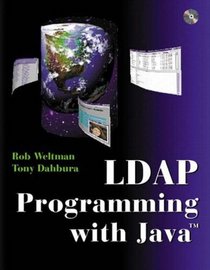Search -
LDAP Programming with Java(TM)
LDAP Programming with Java - TM
Author:
Lightweight Directory Access Protocol (LDAP) is now a staple of enterprise and Internet software environments. Those involved in Internet development where Java(tm) technology is prominent or in Enterprise Information Systems, will need to understand how to use Java technology - and in particular the Directory SDK for Java - to unlock the power ... more »
Author:
Lightweight Directory Access Protocol (LDAP) is now a staple of enterprise and Internet software environments. Those involved in Internet development where Java(tm) technology is prominent or in Enterprise Information Systems, will need to understand how to use Java technology - and in particular the Directory SDK for Java - to unlock the power ... more »
ISBN-13: 9780201657586
ISBN-10: 0201657589
Publication Date: 2/2000
Pages: 720
Rating: ?
ISBN-10: 0201657589
Publication Date: 2/2000
Pages: 720
Rating: ?
0 stars, based on 0 rating
Publisher: Addison-Wesley Professional
Book Type: Hardcover
Members Wishing: 0
Reviews: Amazon | Write a Review
Book Type: Hardcover
Members Wishing: 0
Reviews: Amazon | Write a Review
Genres:
- Computers & Technology >> Networking & Cloud Computing >> Networks, Protocols & APIs >> LDAP
- Computers & Technology >> Networking & Cloud Computing >> Networks, Protocols & APIs >> General
- Computers & Technology >> Programming >> Java >> General
- Computers & Technology >> Programming >> General
- Computers & Technology >> General




